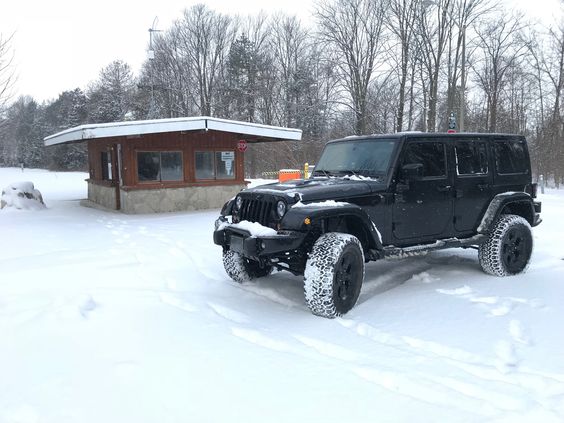Are Jeeps Good In The Snow?

Jeeps have a well-deserved reputation for their off-road capabilities, and winter driving is no exception. While many SUVs struggle in snowy conditions, Jeeps are designed to handle a variety of terrains, including snow-covered roads. In this article, we'll explore Jeep's winter driving performance in more detail, including winter driving events and competitions, snowplowing capabilities, snow performance in extreme weather conditions, comparison to other SUVs, and maintenance and care tips for winter driving.
Jeep Winter Driving Events and Competitions
Winter driving events and competitions are a great way for Jeep owners to showcase their vehicle's capabilities in the snow. There are various events and competitions for Jeep owners to participate in, including snow plowing and off-road races. Snow plowing competitions involve Jeeps with plows attached, competing to see who can clear the most snow in the shortest amount of time. Off-road races, on the other hand, involve Jeeps navigating through snow-covered terrain, testing their handling and control in the snow.
Jeep enthusiasts have noted that these events highlight the vehicle's snow performance. Jeeps are designed to handle a variety of terrains, and winter driving events allow owners to see their Jeeps' capabilities firsthand. The 4WD system in Jeeps gives them superior traction in snowy conditions, and their high ground clearance allows them to navigate over snowdrifts and other obstacles with ease.
Jeep Snowplowing Capabilities
Jeeps are also well-suited for snowplowing. Their maneuverability and 4WD system makes them ideal for navigating through snow-covered roads and driveways. Additionally, the ability to attach a plow to the front of the Jeep makes clearing snow a breeze. Jeep owners who have used their vehicles for the snowplowing note that the process is faster and more efficient than using a standard snowblower.
One of the advantages of using a Jeep for snow plowing is its ability to handle steep inclines and deep snow. The 4WD system in Jeeps gives them superior traction, allowing them to tackle even the most challenging snowplowing tasks. Additionally, their high ground clearance allows them to navigate over snowdrifts and other obstacles with ease. related articles: JEEP WRANGLER CAMPING TIPS

Snow Performance in Extreme Weather Conditions
Driving in extreme winter weather conditions can be challenging, but Jeeps are built to handle these conditions. In blizzards and heavy snowfall, Jeeps' 4WD system and high ground clearance allow them to navigate through the snow with ease. However, driving in extreme winter weather conditions does come with challenges, such as reduced visibility and icy road conditions.
To help mitigate these challenges, it's important for Jeep owners to take safety precautions when driving in extreme winter weather conditions. This includes adjusting speed, using the 4WD system effectively, and keeping a safe distance from other vehicles. Additionally, it's important to ensure that the Jeep is properly winterized, with appropriate tires, windshield wipers, and fluid levels.
Jeep Snow Performance Compared to Other SUVs
Jeeps are often compared to other popular SUVs in terms of their snow performance. Compared to other SUVs, Jeeps have several features that give them an advantage in snowy conditions. For example, Jeeps have a 4WD system that distributes power to all four wheels, giving them superior traction in slippery conditions. Additionally, Jeeps have high ground clearance, allowing them to navigate over snowdrifts and other obstacles with ease.
Jeep owners who have compared their vehicles to other SUVs in the snow note that Jeeps perform better overall. Their 4WD system and ground clearance give them an edge over other SUVs, particularly in deep snow and on steep inclines.

Snow vs. Ice Performance
Snow and ice present different challenges for drivers, and Jeeps' performance can vary depending on the conditions. While Jeeps are designed to handle snowy conditions, driving on ice requires additional precautions. Snow provides more traction than ice, so Jeeps' 4WD system and high ground clearance are still beneficial in snowy conditions. However, on icy roads, tire type and road conditions play a more significant role in a Jeep's performance.
To improve a Jeep's performance on the ice, it's important to use appropriate tires. Winter tires are specifically designed for driving on ice and snow, and they have a tread pattern that provides better traction in these conditions. Additionally, it's important to adjust driving speed and maintain a safe distance from other vehicles, especially when braking or turning.
Maintenance and Care for Winter Driving
Proper maintenance and care are essential for winter driving in any vehicle, including Jeeps. Regular tune-ups and winterization practices are important for ensuring that the vehicle is in top condition for driving in snowy conditions. This includes checking the battery, brakes, and fluid levels, as well as ensuring that the tires are properly inflated and have adequate tread.
Jeep owners should also consider investing in snow tires, which are specifically designed for driving in snowy conditions. Snow tires have a tread pattern that provides better traction on snow and ice, which can help improve a Jeep's handling and control in the snow.
During the winter months, it's important to properly store and care for the Jeep. This includes keeping the vehicle clean and free of salt and other debris that can cause rust and other damage. Additionally, storing the Jeep in a garage or other covered area can help protect it from the elements.
The cost of maintenance and care for a Jeep used in snowy conditions can vary depending on the specific model and the level of winterization needed. However, investing in regular maintenance and care can help prevent costly repairs down the line.
In conclusion
Jeeps are well-suited for winter driving, thanks to their 4WD system, high ground clearance, and other features that give them an edge in snowy conditions. Winter driving events and competitions, as well as snowplowing capabilities, highlight the Jeep's performance in the snow. When driving in extreme winter weather conditions, Jeep owners should take safety precautions and ensure that their vehicle is properly winterized. Compared to other SUVs, Jeeps generally perform better in the snow, and investing in maintenance and care can help prevent costly repairs down the line.

